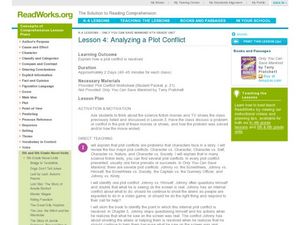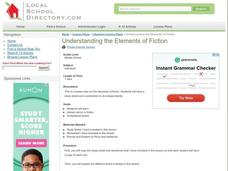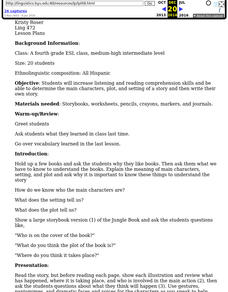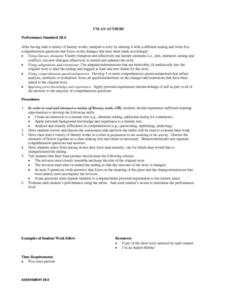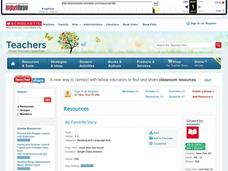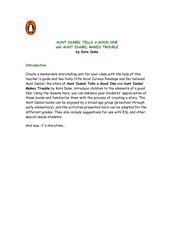Curated OER
Noisy Nora, Studious Students: Story Elements
Alliterative adjective nicknames generate stories inspired by Rosemary Wells' book Noisy Nora (also a thematic complement to any class with children who make a ruckus to get attention). Class members explore basic story elements --...
Curated OER
Plot and Conflict in W.W. Jacob's "The Monkey's Paw"
Tenth graders analyze the use of literary elements in W.W. Jacob's "The Monkey's Paw." Literary analysis is accomplished by a review of the plot and order of events in the story. Learners work in pairs to match the events from the story...
Curated OER
Analyzing a Plot Conflict
Sixth graders analyze plot conflict with science fiction and TV programs. After discussing the conflict, they identify solutions for the programs selected. They examine Only You Can Save Mankind for conflict, and consider ways the...
Curated OER
Understanding the Elements of Fiction
Inform your class on the elements of fiction: themes, settings, characters, plots, dialogue, narration, flashback, clues, climax, resolution. They write the definitions of the terms on the worksheet provided.l Tip: Have them write a...
Curated OER
Language Practice
The simple instructional techniques described in this plan will help young readers learn and practice basic reading skills and strategies. Before reading, introduce your readers to the meaning of main character, setting, and plot. Then...
Curated OER
What Makes a Novel a Novel?
They always say to write what you know. This approach is used to get middle schoolers prepared to write novels of their own. Using a favorite book as a model, potential novelists respond to prompts that ask about characters, plot, main...
Curated OER
Plot and Conflict
Students listen to a short story by Mildred Taylor entitled, "Song of the Trees." They focus on and discuss the elements of plot and conflict. They determine which events are examples of the central conflict and which elements of the...
Curated OER
Introducing Literary Elements in Fiction
Identify literary elements in fiction. In this reading comprehension lesson, learners read the book Pigsty and record literary elements onto a graphic organizer. They specifically discuss the main characters and events in the text.
Curated OER
Identifying Plot Conflicts
Fifth graders identify plot conflicts in the text. In this plot conflict instructional activity, 5th graders read Dogs Don't Tell Jokes and recognize examples of character vs. self and character vs. character.
Curated OER
I Am An Author
Analyze and interpret a literary work your class has read during the course. After reading a variety of literary works, middle schoolers alter the ending of a selection by creating an alternate ending. They generate five comprehension...
Curated OER
Create a Playbill!
Seventh graders explore the various elements found in the advertisement of a dramatic experience. Playbills are created that reflect the plot without revealing the climax of the play. Costumes, set construction, and character description...
Curated OER
My Favorite Story
Students discuss their favorite book. In this book discussion lesson, students name the title and tell what makes the book special. Students also review the setting, plot, conflict, and resolution. Students make a book that tells all of...
Curated OER
The News Behind the Story
What a fun way to analyze plot, setting, and character. Learners review story elements, read a short fictional story, then turn the events of that story into a headlining news paper article. Not only does this lesson engage critical...
Curated OER
Aunt Isabel Tells a Good One...
Explore language arts by reading two similar stories in order to compare and contrast them in class. Young readers read two Aunt Isabel books, by Kate Duke, and discuss the main characters, plot, and setting. They complete a graphic...
Curated OER
Fifteen Seconds of Fame
A reading of Panic in Paris launches a review of the elements of narrative writing. Class members work in groups to find narrative devices in the book and record their findings on a provided worksheet. Using the completed pages,...
Curated OER
Discovering Language Arts-Intermediate Fiction
Explore the elements of science fiction. Young scholars investigate the literary elements present in science fiction and write their own science fiction stories.
Curated OER
Story Pyramids
Young writers generate descriptive words. They use pictures of various landscapes (from books, magazines, or the Internet) and complete a story pyramid. The pyramid (included here) asks to describe the main character, the setting, and...
Curated OER
Different Strokes For Different Folktales
Young readers use graphic organizers, such as Venn diagrams and story maps, to analyze a variety of folktales and the elements of a story. They use writing, sequencing activities, and creative art to identify the morals learned from a...
Curated OER
Frame Story "The Celebrated Jumping Frog of Calaveras County"
Mark Twain's frame story, "The Celebrated Jumping Frog of Calaveras County" provides an opportunity for a study of this story-within-a-story pattern. Using an illustrated template, class members record a plot summary of the frame story...
Curated OER
Analyzing the Use of Irony in a Short Story
Ninth graders examine how literature connects to real-life and see how irony aids in the development of theme. They read Shirley Jackson's The Lottery, and discuss elements of foreshadowing and situational irony. Then learners will write...
Curated OER
Language Arts: Plot Summary
Eighth graders implement plot summary organizers to identify essential elements such as conflict and resolution in literature. In pairs, they retell fairy tales to each other and complete plot summaries about them. As students read new...
Media Smarts
Scripting a Crime Drama
Develop novice script-writers. Small groups sift through a sample script, noting any script-writing conventions to share with the whole class. Using these conventions and plot structures, these groups compose a script for a 10-minute...
Curated OER
Robinson Crusoe Island Adventure
After reading and describing the characters, setting, and plot in The Adventures of Robinson Crusoe, class members write original Island Adventure narrative pieces including detailed descriptions of people, places, and things. Afterward,...
Pennsylvania Department of Education
Drawing Conclusions Based on Literary Elements
Students compare versions of Cinderella and draw conclusions based on the story elements identified. In this literacy comprehension and story elements lesson, students read several versions of Cinderella, complete a "Comparing Folklore"...
Other popular searches
- Plot Elements
- Plot Structure Elements
- Short Story Plot Elements
- Teaching Elements of Plot
- Structural Elements of Plot
- Story Elements Plot Chart
- 5 Elements of Plot
- Identify Plot Elements
- Parallel Plot Elements
- Elements of Plot Movie
- Elements of Plot Quiz
- The Elements of Plot


